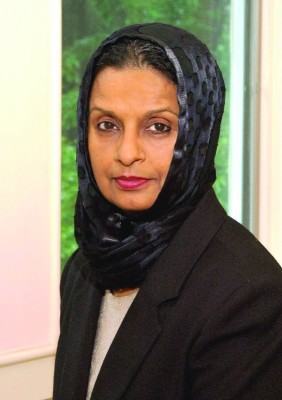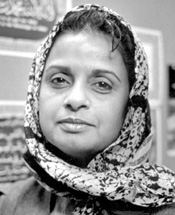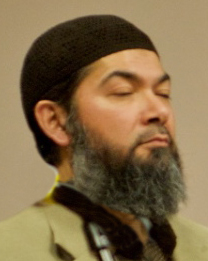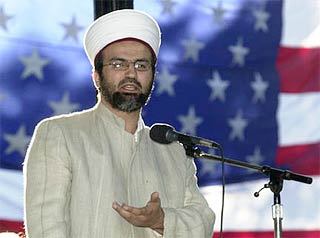Encouraged by the recent success of Allah’s devotees in introducing America to Islam less than three months ago on September 11, 2001, Busha Fouz Mohammed and other Arabs began their jihad at the UMass Campus Center, creating a very tense atmosphere.
The Daily Collegian describes the teach-in as “emotionally charged,” “conflicted,” “high tension,” and difficult to maintain peaceable discussion.”
The Arabs Students first repeated the message of Osama Bin Laden to the still shell-shocked Americans…
Bin Laden began his message by telling listeners that the Palestinian-Israeli conflict has always been the primary cause for friction between the West and the Muslim world – a struggle which he said was getting more difficult due to European policies biased in Israel’s favor.
“The Palestinian cause has been the main factor that, since my early childhood, fueled my desire, and that of the 19 freemen (Sept. 11 bombers), to stand by the oppressed, and punish the oppressive Jews and their allies,” the al Qaeda chief said.
“We shall continue the fight, Allah willing, against the Israelis and their allies, in order to pursue justice for the oppressed, and we shall not give up one inch of Palestine, as long as there is still a single true Muslim alive.”
The Massachusetts Daily Collegian – November 29, 2001
“The Palestinian Struggle: Popular Resistance, U.S. Foreign Policy, and the Media.”
The Arab Students Club and the University of Massachusetts Palestinian Action Coalition co-sponsored a teach-in last night in the Campus Center called “The Palestinian Struggle: Popular Resistance, U.S. Foreign Policy, and the Media.”
The event was well-attended, with a standing-room-only audience that struggled to cram inside Campus Center Room 904 to listen to the night’s featured speakers:
Bushra Mohammed, a slam poet who writes about Palestinian political issues; Mazin Qumsiyeh, a political activist and an Assistant Professor at Yale University; and Anthony Arnove, an activist with the International Socialist Organization.
The event would become emotionally charged and conflicted as the night drew on, and as one opinion after another clashed with opposition in the room.
The difficulty of maintaining peaceable discussion appeared to be an issue from the very beginning, when Alicia Klein, of the Arab Students Club, introduced the event with the caution that “we’d like to keep the questions tonight questions, not statements.
…
Tension was already high as Mohammed began to read. There were visible reactions among members of the audience to lines such as “we now, the new Wandering Jew,” in reference to Palestinian refugees. Finally, before her selection “Liberation from a Freedom Fighter,” Mohammed said to the audience, “I want you all to keep in mind that I am a poet. I write from my heart. You want objectivity? Go home and watch CNN.”
Even this statement was met with debate. “CNN isn’t objective!” an unidentified audience member yelled back.
“Well, then, if you want to hear what you want to hear watch CNN,” Mohammed replied. “Maybe you can be rocked to sleep by their lulla-lies.”
Qumsiyeh took the microphone next. He discussed his personal experiences growing up on the West Bank, and wove in his own perspective on Israeli-Palestinian history. He said that before 1967, “I didn’t know much about Judaism or Jews or what their thoughts were.
“But in that year, as the Israelis took over the West Bank, I saw soldiers and I saw fear.”
Someone in the audience shouted, “what happened in 1947 and 1948?”
“These bombings aren’t happening in Tel-Aviv,” he claimed. “They’re happening on the West Bank and the Gaza Strip, in occupied areas, where 400 Jewish settlers in Hebron control the lives of 100,000 Palestinian refugees.”
These comments were met with outspoken disagreement from several members of the audience. Klein stood and reminded them to save questions for after the speakers had finished.
“The media doesn’t really tell you what is happening,” Qumsiyeh continued. He gave a list of websites, including www.intifada.org, and www.palestineremembered.org, as “good sources that debunk Zionist myths.” Again, there was visible and audible unrest in the crowd.
The emotionally charged talks continued with Arnove’s speech concerning what he termed “The US relationship to Israel and our responsibility for some of the crimes against humanity that [Qumsiyeh] just described.”
According to Arnove, United States financial and military aid “has allowed Israel to carry out immense human rights abuses.”
He then explored the origins of the US-Israeli alliance. Citing the United States’ “horrible historical record when it comes to protecting the rights of Jews,” Arnove moved argued that for the United States the alliance “is a purely strategic and cynical one,” aimed mostly at controlling oil production in the region and, as he put it, “punishing other states for contradicting US interests in the area.”
“Israel doesn’t have oil!” came a protest.
According to Arnove, US taxpayers should address the issue of US aid to Israel.
Mohammed then closed the event with three more poetry selections, ending her reading in tears.
Audience member Aura Spivak, a Senior Women’s Studies and English Major, said that she was “stung” by what the featured lecturers had to say. She took particular exception to Qumsiyeh’s claim that there were no bombings going on in Tel Aviv, and Arnov’s characterization of Israeli leader Ariel Sharon as “a mass murderer” during his talk.
She said that the speakers were “obviously very educated people, so I’m disappointed that they would skew events this way. I just don’t like it when only part of the truth is what’s given. Because part of the truth is basically a lie.”








